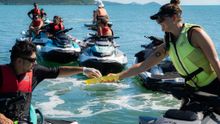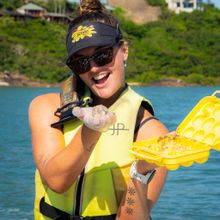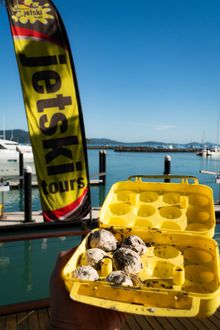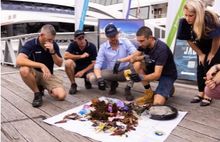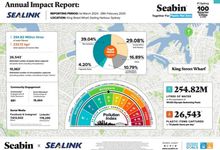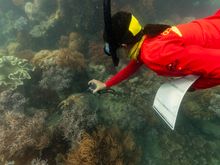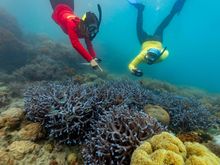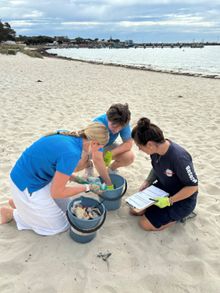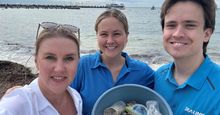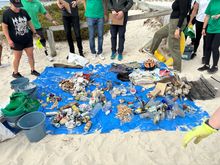 04 Jun 2025
04 Jun 2025
Tags: #WorldEnvironmentDay, #WorldOceansDay, #ProtectOurPlanet, #marineconservation, #ReefRestoration, #WildlifeProtection, #ReefRehabilitation, #SeabinProject, #sustainabletourism, #WasteReduction, #CleanEnergy, #zeroemissions, #communityengagement, #greatbarrierreef

In recognition of World Environment Day (5 June) and World Oceans Day (8 June), SeaLink Marine & Tourism is highlighting its wide-ranging environmental and sustainability initiatives across Australia, reflecting a company-wide commitment to protecting the planet, reducing waste, and preserving the oceans that support our livelihoods, ecosystems, and global wellbeing.
With operations spanning islands, coastlines, inland waterways, rivers, and diverse land and marine ecosystems, SeaLink recognises that sustainability is not a choice but a responsibility of all businesses who operate in marine and land environments.
“As one of the country's leading marine and tourism operators, we have a duty to lead by example,” stated Donna Gauci, CEO of SeaLink Marine & Tourism.
From remote coastal communities to World Heritage-listed destinations, our teams are implementing practical, place-based solutions that support a cleaner, greener future for generations to come,” Ms Gauci said.
SeaLink is embedding sustainability across its operational footprint through a formal Environmental Management Plan, which provides a consistent framework for environmental responsibility across all its business units. Efforts focus on reducing waste, improving energy efficiency, minimising environmental impact, and protecting and maintaining natural ecosystems. Progress is measured through ongoing inspections and key performance indicators to ensure continuous improvement year-round.
Key initiatives include:
Recycling and Waste Minimisation
- Digital ticketing has replaced paper tickets across Western Australia, New South Wales, South East Queensland, and North Queensland.
- Coffee cup recycling is now in place at onshore cafés.
- Container and paper recycling programs are active in the Northern Territory, South Australia, Western Australia, Bruny Island, K'gari, and the Whitsundays.
- Uniform recycling and reuse schemes divert end-of-life textiles from landfill.
- Waste separation, composting, and worm farming have expanded at K'gari's Kingfisher Bay Resort.
Water and Plastic Reduction
- Biodegradable water bottles are used in the Whitsundays, and paperboard-packaged Knowledge Water is offered in the Northern Territory.
- Refillable water stations on The Jackson in New South Wales and on SeaLink and Captain Cook Cruises vessels in Western Australia to eliminate bottled water use.
- Battery and coolant recycling has been introduced to Bruny Island operations.
Sustainable Vessel Design and Energy-Efficient Infrastructure
SeaLink continues to invest in the future of green maritime transport, with new vessels purpose-built for energy efficiency, lower emissions, and reduced environmental impact. Across recent builds, the company has introduced:
- Yanmar 6AYEM-GT and Scania DI13 marine engines, offering improved fuel economy and significantly reduced emissions
- Solar-integrated electrical systems to support onboard power and lighting
- Significant solar panel arrays installed on selected vessels (e.g. Goodna) to reduce reliance on generators and lower emissions
- LED lighting upgrades and smart battery charging systems to minimise energy waste
- Lightweight, low-drag hull designs that improve fuel performance
- Fuel usage is being reviewed, with efficiency practices introduced to reduce diesel consumption and emissions
- Continued investment in innovative projects, including hydrogen-powered ferries, and exploration of electric propulsion options for future vessels.
These innovations are already in use on vessels operating in South Australia, New South Wales, Queensland, and Tasmania, contributing to measurable reductions in fuel consumption.
Shore-side, SeaLink is also upgrading its terminals with solar panel installations, LED lighting conversions, and building retrofits designed to enhance energy performance.
Electric vehicle infrastructure and Electric Vehicle trials are currently underway at Kingfisher Bay Resort and other resort operations, further expanding SeaLink's low-emissions footprint.
SeaLink also places strong emphasis on protecting marine environments and supporting ocean health. Across the country, teams are reducing ocean-bound waste through improved onboard waste management and eco-friendly alternatives.
Marine and Wildlife Protection
- Turtle-friendly lighting has been installed at key coastal sites on K'gari.
- Ocean-safe sunscreen protocols are in use across South Australia, North Queensland and Western Australia.
- Kingfisher Bay Resort's environmental team leads wildlife monitoring and habitat restoration projects.
- The Whitsundays team is supporting the Scaling Seagrass Project to help protect vital seagrass meadows that support turtles, dugongs and marine life.
Ocean Health and Waste Prevention
- Seabin devices have been installed to collect marine debris from ferry terminals and marina areas in Sydney Harbour.
- Staff and volunteers participate in beach clean-ups in coastal regions including Western Australia, Whitsundays and North Queensland.
- Sustainable waste diversion systems are in place to reduce runoff and protect fragile ecosystems on K'gari.
Reef Restoration and Monitoring
- In North Queensland and the Whitsundays, SeaLink supports reef restoration, coral planting, and reef health monitoring in partnership with local conservation programs and the Great Barrier Reef Marine Park Authority.
- Kingfisher Bay Resort contributes to reef rehabilitation efforts, helping to protect coral communities and surrounding marine environments in the region.
“These initiatives reflect SeaLink's deep connection to Australia's waterways and our commitment to preserving the environment for future generations, while inspiring and educating our guests along the way,” explained Ms Gauci.
“SeaLink is also deeply embedded in the communities where we operate, many of which are home to our team members. This close connection to these communities drives our strong sense of responsibility to protect and promote the unique environments and cultures of each region,” Ms Gauci said.
Across Australia, SeaLink works with local councils, Traditional Owners, and community groups to support place-based sustainability and respect for Country. From grassroots initiatives and school engagement to environmental education and local fundraising, SeaLink remains focused on helping communities thrive now and into the future.
“SeaLink Marine & Tourism's environmental strategy is grounded in education, accountability and meaningful action. Each business is encouraged to adapt initiatives to suit local conditions, ensuring sustainability is embedded in daily operations rather than limited to key environmental dates,” Ms Gauci continued.
With more than 11 million metric tonnes of plastic entering the oceans annually, and Australia producing over 76 million tonnes of waste each year, the need for local action is urgent.
“Whether it's improving fuel efficiency, reducing plastic use, or designing more sustainable vessels, every step matters. Sustainability is a journey, and we are committed to making intentional changes that have a lasting, positive impact across Australia,” said Ms Gauci.
For more information on SeaLink Marine & Tourism's Environmental Action Plan visit SeaLink Sustainability.
-- ENDS --
SeaLink Marine & Tourism is part of Kelsian Group Limited (Kelsian), Australia's largest integrated multi-modal transport provider and tourism operator, with established bus operations in Australia, Singapore, USA, and the Channel Islands. Kelsian provides essential journeys for our customers by delivering safe and intelligent transport solutions designed to improve the sustainability and liveability of the communities we serve.
Kelsian has over 35 years' experience delivering tourism and passenger transport services. The Group is a leader in sustainable public transport as the operator of Australia's largest zero emission bus fleet and Australia's largest electrified bus depot.
As at 31 December 2024, Kelsian directly employs over 12,600 people and operates over 5,800 buses, 115 vessels and 24 light rail vehicles that delivered more than 378 million customer journeys over the last year. (www.kelsian.com).
Media contact: Cheryl Monkhouse, National Media & Communications Manager, cheryl.monkhouse@sealink.com.au


